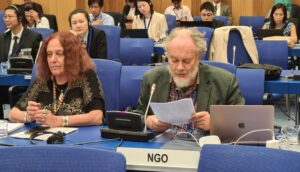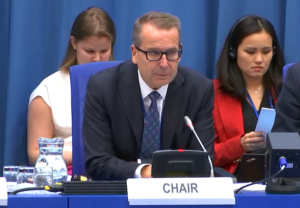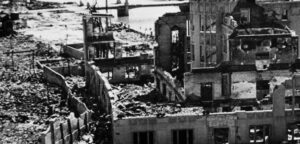by Uta Zapf *
On January 20, 2022, the Bulletin of Atomic Scientists will re-set the Doomsday Clock indicating the level of threat to civilisation from nuclear weapons, climate change and other existential risks. The Doomsday Clock currently stands at 100 Seconds to Midnight. In this article Uta Zapf explores how we could turn back the clock, prevent nuclear war and advance nuclear disarmament including through the adoption of no-first-use policies.
The Doomsday Clock is at 100 seconds to midnight. It is high time to eliminate the risk of humanitarian disaster caused by nuclear weapons. Many analysts apprehend that we are on the brink of nuclear war.
The consequences of even a limited exchange of nuclear bombs would be disastrous for the earth. Whole cities would be wiped out, killing millions of people. Disruption of global climate conditions would immediately occur and global famine caused by “nuclear winter” would follow. Social and economic systems as well as all health systems will collapse. There will be no support and relief for victims. There will be no recovery for decades or even a century.
Most treaties limiting nuclear weapons have been abandoned, tensions between nuclear powers are rising And an enormous arms race is going on. Trust and confidence are vanishing. Nuclear powers are modernizing their nuclear weapons stockpiles and are developing sophisticated new weapons designs. It is of paramount importance we avert this deadly arms race.
Calls for No-First-Use
Seven hundred scientists in an Open Letter recently asked President Biden to reduce the risk of nuclear war and called for a no-first-use policy to be implemented. “Nuclear weapons are never going to be the answer. Why should we or anyone else want to wipe out most if not all of humanity?” the letter quotes Sir Richard Roberts, Nobel laureate of medicine in 1993. The scientists stated: ”The sooner we reduce the numbers and set an example for others to do so also, the more likely it is that our civilization can continue.“
The most quoted sentence these days is the one President Reagan and President Gorbachev uttered when signing the INF-Treaty in 1987: “A nuclear war can never be won and should never be fought.”
This wise sentence has been repeated by President Biden and President Putin on the occasion of their summit in Geneva on July 16, 2021. This sentence has been repeated and mirrored by numerous other Open Letters to President Biden who is preparing a Nuclear Posture Review and who is pondering on implementing a no-first-use in the US nuclear strategy. Other open letters and a civil society working paper to the NPT Review conference aim to convince participating states of the Review Conference of the NPT, which is again being postponed to August 2022, to include a pledge of a no-first-use in the NPT Final Document.
No-First-Use is not new
No-first-use is not a new idea. Nuclear doctrines differ and have been changed from time to time.
China from the beginning of its possession of NW in 1964 declared a no-first-use and confirmed it in 2005, and it keeps its missiles de-alerted. In 1994 it proposed a Treaty on the No-First-Use of Nuclear Weapons.
India adheres to a no-first-use policy to date. In 1988 Rajiv Gandhi offered an action plan to eliminate NW globally.
Russia declared a no-first-use from 1982 until 1997, after that it changed its nuclear strategy twice. The first change provides for the use of NW in case the existence of the state was in danger. In 2000 it changed the strategy again to a use of NW if there were no other means, or means had proven ineffective to protect the survival of the state.
France preserves the right for preemptive use as a last warning and intends to use NW against chemical and biological attack.
Great Britain has just announced its intention to use NW against chemical and biological aggression too.
France and Great Britain by these declared strategies undermine the Chemical Weapons Convention as well as the Biological Weapons Convention. In addition France’s declaration of a preemptive use is extremely reckless and irresponsible.
We should remember that German Foreign Minister Joschka Fischer in November 1998 proposed a no-first-use policy, but was rejected by NATO.
Adoption of a no-first-use policy will be a first step and a door opener for an urgently needed dialogue on the role of NW in military doctrines and strategies.
What the Review Conference must achieve
The upcoming Review Conference could be a welcome opportunity to decide on immediate talks on nuclear doctrines and strategies and on a diminished role of nuclear weapons in security policies.
To achieve risk reduction policies, the most suitable measure will be to declare a unilateral, bilateral or multilateral no-first use! Any of those would be an utmost favorable outcome of the Review Conference!
All participating states must be interested in a successful result. Many working papers for the Review Conference refer to the results of the years 2000 and 2010 as a desirable requirement for 2022 and want to avoid the disaster of the 2015 outcome in order not to endanger the NPT as whole.
There is a lot of unfinished business remaining from 2000 and 2010:
- We need to bring into effect the Nuclear Test Ban Treaty;
- We need to conclude a Fissile Material Cut Off Treaty;
- We need to see Nuclear Weapon States de-alerting their nuclear weapons;
- We need to see multilateral negotiations and agreements on reducing the role of nuclear weapons in doctrines and strategies, to minimize the risk that these weapons will ever be used and to facilitate the process of their total elimination;
- We need to see reductions of arsenals as well as increased transparency and confidence-building measures.
All these promises were laid down in the 13 steps of 2000!
We also would like to remind the nuclear weapons states of the following statement of step 7/2000. It reads:
“Strengthening the ABM Treaty is a cornerstone of strategic stability and a basis for further reductions of strategic offensive weapons in accordance with its provisions.”
President George W. Bush withdrew from this “cornerstone” in 2002. This has fueled a new arms race. We should urgently suggest taking up negotiations on missile defenses. As missile defenses are driving the new arms race we need a new ABM-like accord.
Tasks for the P5
None of the P5, as the nuclear weapons states parties to the NPT (China, France, Russia, the United Kingdom and the United States) are called, has until now acknowledged this. In their Paris Communique of December 3, 2021 the P5, in preparation of the upcoming NPT Review Conference confirmed their commitment “to pursue negotiations in good faith on effective measures relating to nuclear disarmament and on a treaty on general and complete disarmament under strict and effective international control.”
If they really mean it, they should at least agree to a moratorium on modernization and of deployment and production of new nuclear designed weapons. They should follow the proposal of Democrats in the United States Congress contained in the so-called “HALT-Act” of 2021 (Hastening Arms limitation Talks (HALT) Act). Even better, they should join the Treaty for the Prohibition of Nuclear Weapons (TPNW)!
The P5 stress the “importance of transparency of nuclear doctrines strengthening predictability, confidence and mutual understanding” as a risk reduction measure.
This will simply not be enough!
If they really mean it and aspire for risk reduction, they must immediately reduce the role of nuclear weapons. Best method to do this: Just decide on a no-first-use policy!
The P5 declare the support for the CTBT’s entry into force. If they really mean it, China and the US can immediately ratify and press all missing states for the entry into force to follow suit.
The P5 declare support of negotiations of a “non-discriminatory and internationally and effectively verifiable Fissile Material Cut-Off Treaty” based on the Shannon mandate. If they really mean it, it should not be too complicated to decide on the treaty, as the Shannon Draft is there and could be finalized speedily if all of the P5 exert pressure on the members of the Conference of Disarmament.
There has been another welcome statement by the P5 on January 3, 2022, shortly before the NPT Review Conference was again postponed. Their new joint statement takes up the famous sentence “that nuclear war cannot be won and must never be fought”. And they continue by affirming “that nuclear weapons – as long as they exist – should serve defensive purposes, deter aggression and prevent war.” Advice to P5: Don’t prattle, just act! Useful advice – but not far-going enough.
The Stockholm Initiative
There are many good ideas to be found in the working paper on nuclear risk reduction of the Stockholm Initiative for Nuclear Disarmament. The participating states point out the humanitarian, economic, environmental consequences of nuclear weapons detonations and the risk of nuclear weapons being used intentionally, accidentally, by miscalculation or misperception, and they call for a risk reduction dialogue.They also call for reducing the role of nuclear weapons, for de-alerting and overall reductions of stockpiles of all types of nuclear weapons. They plead for renewing the results of the 2000 and 2010 Review Conferences.
They state: ”It is in the interest of humanity that nuclear weapons are never again used” and they also repeat the famous sentence “a nuclear war can never be won and must never be fought”.
They want to “discuss policies that could prevent the use of nuclear weapons and eventually lead to their elimination, lessen the danger of nuclear war and contribute to the non-proliferation and disarmament of nuclear weapons”.
Why do they shy back form the one proposal that could facilitate all of their demands: Implementation of a NO-FIRST-USE?
* Uta Zapf is a former Member of the Bundestag (German Parliamnt) where she served as Chair of the Subcommittee on Disarmament, Arms Control and Non-proliferation. She currently serves as a Member of the NoFirstUse Global Coordinating Committee and a Global Council Member of Parliamentarians for Nuclear Non-proliferation and Disarmament.
Cover photo: Linda Parton, 123RF




